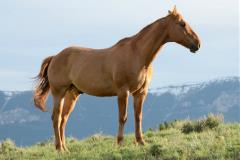Equine Eye Conditions: Indications, Signs, and Examination Tests

Whether caused by injury or disease, damage to the eye of a horse may rapidly progress into a loss of vision. Any impairment should be considered an emergency requiring the immediate attention of a veterinarian.
Equine Eye Conditions to Watch For
Behaviors Indicating Loss of Vision
Behavioral signs that a horse is having vision difficulties include, for example:
- Animal movements appear uncertain, for example:
- Cautiously walking or high stepping
- Stumbling
- Treading on objects that they previously avoided
- Ears are constantly moving, giving horse the appearance of being very alert
- Tilting their head in an awkward position, as if in an attempt to improve what they see
Clinical Signs and Eye Ailments
- Painful eye
- Injuries to the cornea, either through abrasion or a foreign body
- Disorders affecting the inner eye, for example, uveitis
- Eye discharge
- Watery or mucus, without redness or pain
- Problem with the tear duct
- Discharge with pain
- Problem with cornea or inner eye
- Discharge from both eyes
- Conjunctivitis
- Discharge, along with fever and other signs of illness
- Respiratory disease or strangles
- Red eye
- Conjunctivitis
- Ulcers
- Uveitis
- Cloudy eye
- Disease of the cornea
- Uveitis or cataract
- Hard or soft eye
- Glaucoma
- Uveitis
- Color change
- Melanoma or squamous cell carcinoma
- Yellowish tint to sclera could indicate jaundice
- Red tint indicates bleeding
- Yellow could also indicate inflammation or infection inside the eye
- Film over the eye
- Protruded nictitating membrane
- Bulging eye
- Glaucoma
- Tumor
- Abscesses
- Sunken eye
- Dehydration
- Weight loss
- Eye pain
Testing
When completing an eye examination, clients will benefit by understanding the basic types of testing that a veterinarian may utilize.
Animal reaction tests may include:
- Menace Response:
- Horse will blink or move its head away from what it perceives as a threat, response is a reaction to an air current detected on the surface of the eye
- Dazzle response
- Pupil contracts to sudden bright light
- Maze test
- Requires an obstacle course
- Horse goes through course without blinders, then each eye is separately covered and animal is walked through course again, keeping a loose lead
- Field of vision
- Checked by covering one eye at a time with a blinder and tossing something in their field of vision to see if they follow the object
Confirming diagnosis may require gathering information from the following types of laboratory testing:
- Cytology test
- Test requires a sampling of cells
- Fast results
- May show indications of either: lymph cells, fungus, bacteria, neutrophils
- Tear production test
- Information is gathered from a test strip that is placed inside the lower eyelid
- Strip soaks up the tears and as the moisture migrates up the strip, it changes color
- Indicates abnormal tear production that can occur with different diseases known to affect horses
- Fluorescein stain drops
- Placed on the eye surface, the stain identifies irregular epithelial cells
- Tonometry test
- Used to measure intraocular pressure
- Glaucoma check
It is important to inform clients of the risk taken when prompt veterinary attention is not given to a horse with an injured, inflamed, or infected eye. Taking the time to educate them on the symptoms to watch for may help to motivate clients to call their veterinary clinic should their horse need eye care.
Please contact your Covetrus representative at 855.724.3461 for more information on treating equine eye injuries.
Source:Horse Owner’s Veterinary Handbook, 3rd ed., by T. Gore, P. Gore, J.M. Giffin
Need Regulatory Assistance
If you need help with regulatory or licensing issues, we're happy to help. We have a wide variety of resources to help you when issues arise.

Careers
Are you looking for a place to let your talents shine? At Covetrus, we help our practitioner customers better serve their patients and take pride in providing the best customer experience possible. Search our open positions to see our available opportunities.
Newsletter
Stay current with what’s going on with Covetrus, subscribe to receive our newsletter and email communications. Subscribers will receive the latest information in practice management, sales and marketing, animal health, and more.


Leave a comment